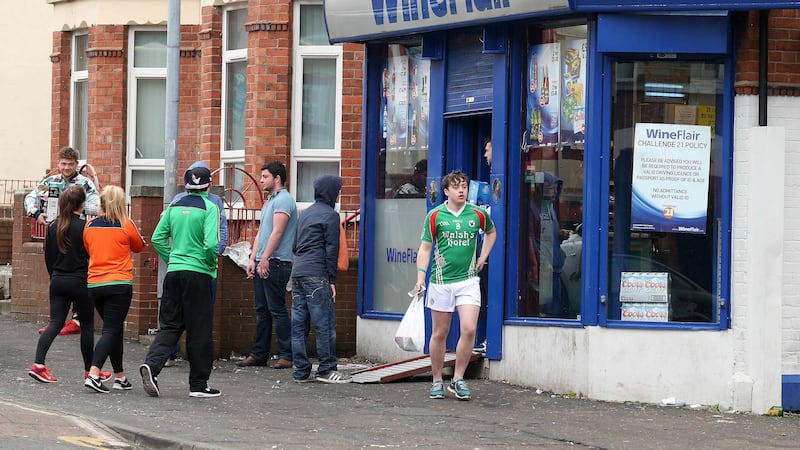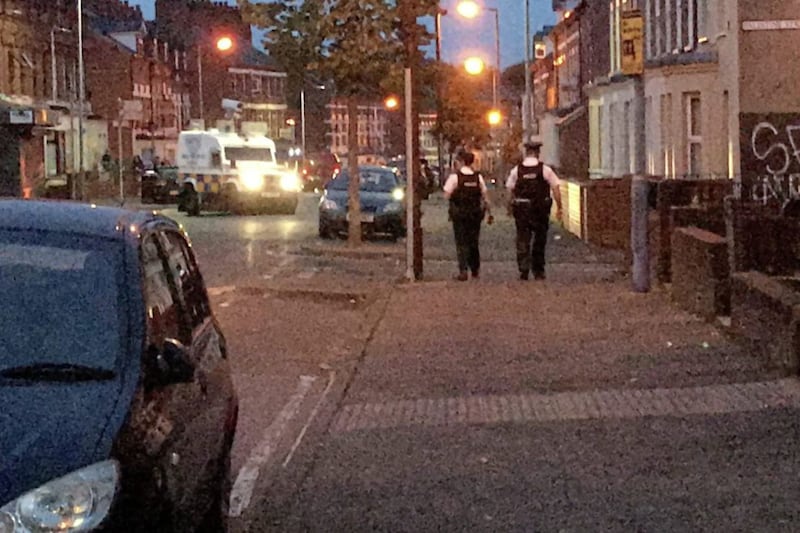BY now the last of the Buckfast bottles will have been cleared away, the celebratory St Patrick's Day vomit mopped up from the pavements around the Holylands, and the hundreds of young people who treated the area in south Belfast as one large doss house for a few days will have decamped home.
The Holylands certainly turned a shade of green last week, although that was only the colour of drinkers’ faces after several pints of cheap vodka.
After all, what better way to mark the national saint’s day than necking spirits? Why not go one better and take a stroll wrapped only in the tricolour, or get arrested for anti-social behaviour?
Two nights of drinking, including one which saw attacks on police, led to eleven arrests and three people charged.
Unfortunately whenever disorder breaks out, our first instinct in the north tends to be to blame anyone other than those responsible.
In one television interview an irate student pointed the finger at the 'meeja' for exaggerating the scale of disturbances and said the Twelfth demonstrations brought similar problems.
There is no doubt that the Twelfth brings its own set of problems, but the familiar cry of ‘themmuns is as bad’ won’t solve problems in the Holylands.
Over the last two decades, most permanent residents have moved out of the area and university students have moved in.
Rent tends to be cheap, but the accommodation is fairly basic, designed to fit a large number of people into one house.
A colleague whose daughter shared a home in the area said she was alarmed to find that a shower had been built into an old airing cupboard.
Our two universities have been quick to disassociate themselves from the disorder. Queen's and Ulster University said most of the people in the area were not university or college students and blamed the two nights of anti-social behaviour on a "societal problem".
However, the loud partying and anti-social behaviour in the Holylands is more than a St Patrick's Day issue.
The few permanent residents who have remained have spoken of their frustration about the bad behaviour that accompanies the student influx every September and continues until the summer break.
And most of the problems centre around alcohol. It hasn’t escaped anyone’s notice that Ireland still has a problem with drinking.
On St Patrick’s Day, think-tank the OECD tweeted statistics about alcohol abuse which showed Ireland is joint fifth in the world for adult alcohol consumption, behind Austria, Czech Republic, Estonia and France.
The OECD later apologised for linking our national day with alcohol abuse, but you can’t argue that there isn’t some truth in the old stereotype of the Irish drinker.
Perhaps it isn’t alcohol, but what it seems to do to us which is the problem. Our courts are full of people who have made catastrophic decisions after a few drinks.
Alcohol makes us lose our common sense as well as our inhibitions. If the behaviour of the last week is anything to go by, it also brings a incredible sense of entitlement.
Binge-drinking is too often seen as a rite of passage. What harm in getting drunk a few times a week? Sure didn’t we all drink too much when we were young?
Except that we didn’t used to. The last few decades have seen huge changes in Irish society, including our relationship with alcohol.
My parents, now in their seventies, don’t drink. Neither did my grandparents. ‘Drink in, wit out’ was one of my Derry grandmother’s most-used sayings.
She would have seen drinking as a waste of money and drunkenness as shameful. And her attitude wasn’t at all unusual.
Now heavy drinking is seen as standard behaviour. Every major event in life, from christenings to weddings and funerals is linked to a few celebratory jars.
If anything, people who don’t drink are treated with suspicion. Refusing a glass of wine marks you out as a stick-in-the-mud set on ruining everyone else’s fun.
It’s the reluctance to join in which is the problem. It takes courage for a young person to say they don’t want to drink when everyone else is downing shots.
But surely it’s high time we changed the old stereotypes by saying no once in a while?
It makes it more difficult to tackle our teenagers' drinking if we can't tackle our own.








